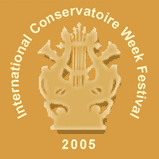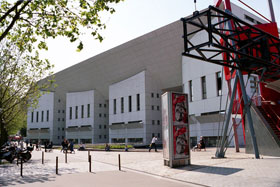
|
|||
 |
|||
 |
|
PARIS CONSERVATOIRE |
|

Two distinct establishments chairedthe birth of the Academy of Paris: the Royal School of Song and Declamation (founded on January 3, 1783 to provide Opera) and the School of Municipal Music (founded in 1792 to train the instrumentalists of the Music of the National Guard). The council school was made official on November 8, 1793, when a national convention approved the creation «in the Commune of Paris» of a national Institute of Music, allocating a regular budget and musical instruments. On 3 August 1795, a law was passed establishing the Academy of Music and superseding the former schools. The Academy was managed by a directory (Gossec, Méhul, Cherubini) and directed by Bernard Sarrette, the so-called «police chief charged with organization». The conservatorie offered a heavily instrumental training program (winds especially, and some harpsichord classes). In addition to the training of the musicians, the Academy had the role of conceiving methodology for instruction in each discipline and the training of the future members of the Opéra Comique, the Theatre-Italian and the Comédie-Française. In 1806, François-Antoine Habeneck created the student orchestra, which performed through 1815, giving a number of performances, including the French premier performances of several Beethoven symphonies. Perceived as a product of the Revolution, the Academy was officially closed under the Restoration (1816). Renamed the Royal School of Music and Declamation, the establishment was later reinstated. It was named the Academy of Music in 1822. It is quite impossible to list all the prominent professors of the Academy among whom are: Fromantal Halevy, Pierre Baillot, Gilbert Duprez and Laure Cinti-Damoreau, Henri Herz, Antoine Marmontel, Louise Farrenc, César Franck, Charles-Marie Widor, Alexandre Guilmant, Louis Diémer, Édouard Risler, Raoul Pugno, Martin, Gabriel Fauré, Maurice Vieux, Maurice Maréchal, Charles Tournemire and Marcel Dupre, Alfred Cortot and Marguerite Long and many others.
|


